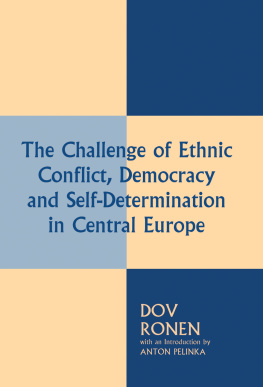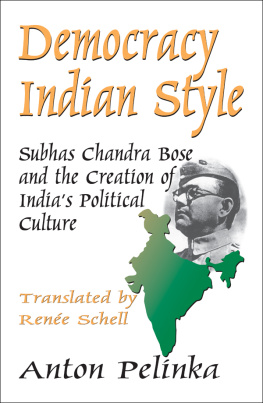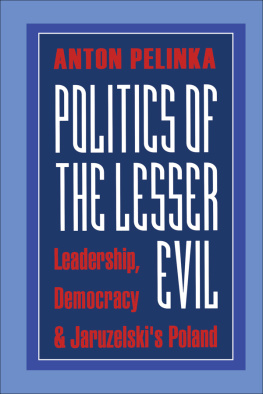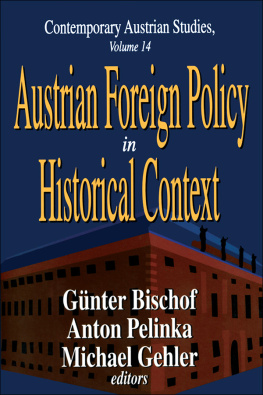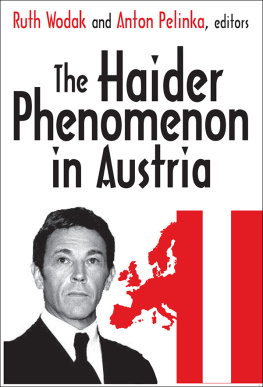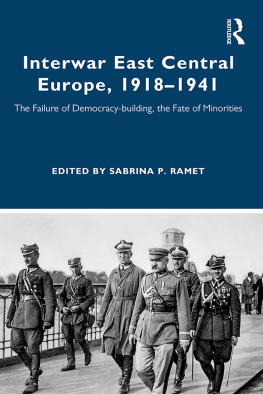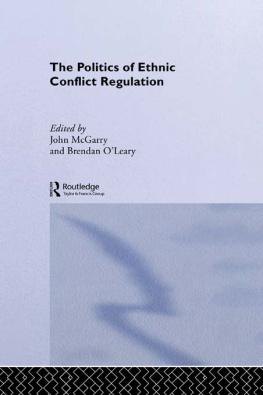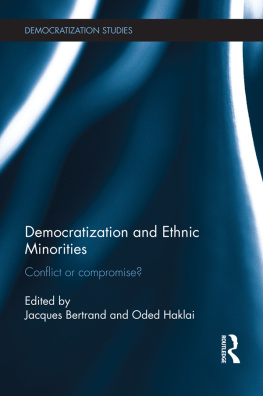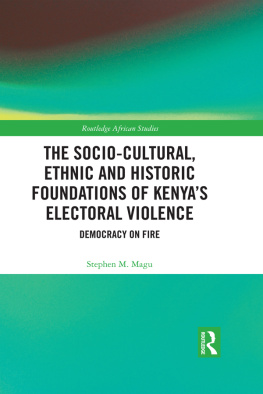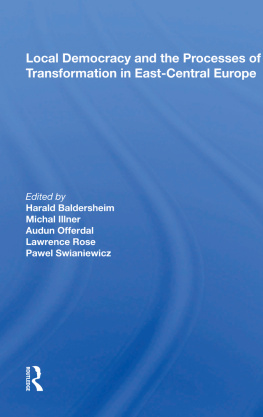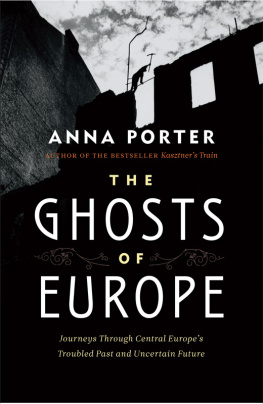First Published in 1997 in Great Britain and in the United States of America by
FRANK CASS & CO. LTD.
Published 2013 by Routledge
2 Park Square, Milton Park, Abingdon, Oxon OX14 4RN
711 Third Avenue, New York, NY 10017 USA
Routledge is an imprint of the Taylor & Francis Group, an informa business
Copyright 1997 Dov Ronen
Introduction 1997 Anton Pelinka
British Library Cataloguing in Publication Data:
A catalogue record for this book is available from the British Library
ISBN 978-0-7146-4752-4 (cloth)
ISBN 978-0-7146-4308-3 (paper)
ISBN 978-1-3150-3779-0 (eISBN)
Libary of Congress Cataloging-in-Publication Data:
A catalog record for this book is available from the Library of Congress
All rights reserved. No part of this publication may be reproduced in any form or by any means, electronic, mechanical, photocopying, recording or otherwise, without the prior written permission of the publisher.
Typeset by Vitaset, Paddock Wood, Kent
Printed in Great Britain by
Bookcraft (Bath) Ltd, Midsomer Norton, Avon
This book is the revised version of a report on a research project conducted at the Institut fur Konfliktforschung in Vienna, Austria, with funds provided by the Austrian Federal Ministry of Science and Research. Dov Ronen, the principal investigator of the research project, drafted the report submitted to the Austrian Federal Ministry as well as this revised version, save the Introduction, which appears under its author's name. It should be noted that the research was a collaborative effort. The report has been read and discussed by the other two project collaborators, Anton Pelinka and Albert Reiterer, and has been revised in light of their suggestions. Nevertheless, views presented in the Introduction rest with its author, while responsibility for the views expressed in the seven chapters rests with the principal author.
The material included here purports to provide an overall assessment of what we called 'ethnic diversity' in Central Europe, presents an hypothesis on the origins of ethnic conflict, and proposes an approach to the prevention and reduction of ethnic conflict in general and in Central Europe in particular.
Our research has not covered that entire Central Europe which, in the eyes of some, reaches from Germany in the west to Ukraine in the east. Eastern Europe was not deemed an appropriate term because present-day Austria was included in our research. East-CentralSouthern Europe may have been a more accurate phrase to use, since we do include the former Yugoslavia, but it was considered awkward. Ultimately, we decided to use the label 'Central Europe'. It covers, for our purposes, roughly the geographic area of the former AustroHungarian and Ottoman Empires and includes Austria, Hungary, the Czech and Slovak Republics, and the countries of former Yugoslavia: the Yugoslav Republic (including Serbia and Montenegro), Croatia, Slovenia, Bosnia-Herzegovina and Macedonia. Within those countries we do discuss most, though not all, ethnic groups.
The book is divided into two parts. , In search of causes and solutions, includes an analysis of the origins of conflict, propositions regarding the resolution of conflict, and concrete policy recommendations. These two parts are preceded by an introductory chapter, Ethnic conflict and democratic theory, by Anton Pelinka, and an overview titled Setting the stage.
We believe this book will be of value to students and scholars interested in conflict resolution in general and in Central Europe in particular. Beyond that, we believe that it may be useful reading to anyone willing to be challenged by what we consider to be an innovative approach to the old problems of ethnic diversity, tension and conflict.
The three collaborators on the research project were assisted by a large number of scholars at several academic institutions. Our thanks are extended to the officers and colleagues at the Institut fur Konfliktforschung (Vienna, Austria), as well as at the Teleki Foundation (Budapest, Hungary), the Center for European Studies and Center for International Affairs, Harvard University (Cambridge, Massachusetts, USA), the Department of Psychiatry, Cambridge Hospital, Harvard Medical School, and the Austrian Institute for East and Southeast European Research (including its offices in Budapest, Bratislava, Brno, and Ljubljana).
We also thank the large number of individuals who have been of great help to us in various phases of this project either directly or indirectly: Viera Bacova, Felix Bister, Dano Butora, Silvo Devetak, Laszlo Dioszegi, Aleksa Djilas, Gyorgy Eger, Jasna Fischer, Sergei Flere, Valeria Heuberger, Herbai Istvan, Csaba Kiss, Matjaz Klemencic, Vladimir Klemencic, Konstantin Knitakis, Othmar Kolar, Gertrud Kothanek, Tamas Kozma, Sabine Kroissenhuber, Rudolf Kucera, Milos Kuret, Petar Lastic, Margit Mery, Alenka Mihailovski, Robert F. Miller, Albina Necak-Luk, Czibor Necas, Kalman Petocz, Richard Prazak, Andreas Pribersky, Iveta Radicova, Rudi Rizman, Davorin Senicar, Jana Starek, Arnold Supan, Stefan Sutaj, Laszlo Szarka, Raj Tamas, Peter Tanzig, Katalin Vadkerti, Eva Varga, and Mitja Zagar.
Special thanks are also due to Mrs Reiter at the Institut fr Konfliktforschung, Vienna, for her skilful administrative and logistical assistance; Saadia Touval and William Safran, both colleagues as well as friends, who read the entire manuscript and made invaluable suggestions for revisions; and to Harte Weiner for her editorial work. Responsibility for any inadvertent misinterpretation of the information and generous advice they provided is solely that of the author.
Anton Pelinka
This book reflects an academic approach to an explosive topic. The topic is the increase of ethnic tensions in the geographic region dominated by communist dictatorship for decades. Since the dismantlement of communist rule, Central Europe has become a hotbed of conflicts erupting from ethnic rivalry. For quite a time, social science has regarded ethnicity as a phenomenon in decline. Now, the increasing importance of ethnicity in Central and Eastern Europe is impossible to ignore.
The academic approach is not only to describe, analyse, and explain conflicts, but also to learn from the experiences of longer established democracies of Western Europe in their dealings with ethnic conflicts. One of the basic questions, and among the underlying interests behind this project's agenda, pertains to the way one might use democratic tools for reducing ethnic conflicts.
The Understanding of Democracy
Democracy is based on a certain understanding of social conflict. The system of 'liberal democracy', as it exists today (Riker, 1982; Dahl, 1989), accepts the competition between organised interests as given fact which has to be reckoned with as an unavoidable reality. Liberal democracy sees the 'commonweal', the fictitious goal of all politics, not jeopardised by contradictions of interests and of values, but as freed by the open and therefore flexible outcome of the political process itself, which has to be accepted principally by all political actors (Fraenkel, 1964).


